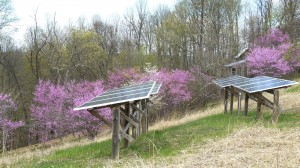Natural gas is just the next round in WV’s rut
Commentary by S. Thomas Bond, Charleston Gazette, April 5, 2016
It seems West Virginia politicians can’t get out of the rut formed by the extraction industries. We’ve gotten deeper and deeper into it since the state was formed in the Civil War. Look where we are with the outflow of our able citizens and our growing age- distribution. Not to mention our very low position on most scales of well-being.
At a recent “roundtable” in Bridgeport with oil and gas industry representatives, Bill Cole, Republican hopeful for the Governorship, told the group, “You guys have a phenomenal story to tell and you end up being the bad guys for some reason. Tell your success stories.”
The honest truth is that the easy stuff is gone from the United States’ 2 percent of the earth’s solid surface. The easy oil was exported for decades around World War II, producing affluence as long as it lasted. By 1970, we were importing, and imports passed national production in the early 1990s. Gas was abundant and cheap until after World War II. It was used freely to make glass and steel with little thought of waste.
Recently, supply had dwindled so plants were being built to receive liquefied gas on our coasts. It was known that vast amounts of gas and oil remained in shale rocks. In the “easy stuff,” it had been trapped in cracks and interconnected pores. In shale, it was locked in tiny packets barely visible to the naked eye down to microscopic in size. Patient research at the Morgantown Energy Research facility developed a new method, commonly called fracking, and George P. Mitchell, with government assistance, tried it. The results appeared fantastic. The early yields were very good and in a short time. This was attractive to investors, who assumed the production would extend 30 or 40 years, like conventional wells.
Everybody and his brother in the oil and gas world jumped into it. Everybody wanted to try his own recipe for it, too. Old ways die hard. Everywhere it was tried, opposition quickly developed. It left the countryside a shambles. Water contaminated, toxic chemicals in the air, mini brownfields, huge areas rocked over, people sick and animals killed. Roads were torn up, royalty withheld, light and noise close to houses and livestock 24/7.
West Virginia alone presently has over 200 nuisance lawsuits. Arrogant young men in big pickups came from all over the country to do the labor. They were overworked, with a high rate of injury and close contact with dangerous chemicals in all kinds of weather. At first, complaints were put off by industry and officials alike, but the phenomenon is worldwide and science is slowly establishing the validity of the community claims.
Opposition continues to grow. The economics are awful. The yields go down to half in a couple of years and the wells are economic no more in six or seven. The recovery is 6 percent or 7 percent of the gas or oil in place, leaving the rest with no secondary recovery. The return on investment in terms of steel, energy, chemical input, is far lower than conventional drilling. Similar complaints are made for the hundreds of miles of pipeline required to get the oil or gas from production to use.
The over-production has resulted vast loss of investment and now is compared to the 2008 subprime housing scandal. Very few workers are required to get the gas — far less than the competing ways to get the energy — conservation, solar and wind. Fracking is strictly high investment, low labor. The few workers are well paid, but few women choose the work, and you are out of it long before retirement age, even if you aren’t injured or poisoned. Only fit, aggressive young men need to apply. And when you get out of it, you aren’t trained to do anything else. [The biggest reason for our huge military is the need to secure control of oil and gas. We spend $58 million an hour, more than the next 10 countries combined.]
Mr. Cole, get real. Fracking is the hard way to get energy. It will last only a few decades, will do more damage than coal has, and contributes to pollution of the atmosphere. Coal didn’t make us West Virginians rich, it just ruined a lot of our surface and broke many of our people. Fracking is doing the same. We need to get on into the 21st century.
>>> S. Thomas Bond, Lewis County, WV, is a retired chemistry professor and a member of Mountain Lakes Preservation Alliance.
See also: www.FrackCheckWV.net

